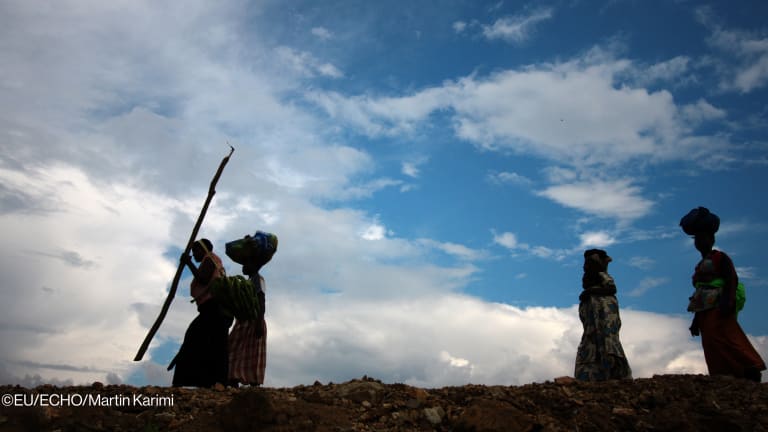Webinar: 7 tips for building a better response to sexual assault
Across the development industry, organizations are rethinking their policies for responding to — and preventing — sexual harassment and assault at work.
In the wake of #MeToo — and now #AidToo — United Nations agencies, former government officials and international NGOs are shining a light on a problem endemic to the development and humanitarian community. Just as importantly, they are also shining a light on the solutions.
Devex’s careers and recruiting expert Kate Warren spoke with KonTerrra Group’s Lead Consulting Psychologist Kavita Avula and human rights lawyer Megan Nobert about which policies work — and which don’t — for preventing and responding to sexual violence.
Their advice is below, and you can view the full webinar here.
1. Start with recruitment.
Complete thorough background and reference checks for your potential employees. If possible, check in informally with your network of human resources professional.
If you’re contacted for a background check, make sure you share any information that you have on perpetrators of sexual violence. In your hiring contracts, include a section that outlines how your organization will disclose any complaints to future employers.
2. Have a clear sexual violence policy that is updated regularly.
Outline a zero tolerance policy for sexual violence. Make sure you have all of the information your employees need — from a commitment to a workplace free of sexual violence to what the reporting process entails. For cross-cultural contexts, it’s particularly important to include examples of inappropriate behavior. Go the extra step to ensure it’s both easily readable and actionable.
It’s also important to include protection against retaliation in your policy — and enforce it.
A team of leaders or a task force should review your policy at least once a year.
3. Follow through on your policy’s promises.
Take reports seriously. Regardless of who it comes from — whether it’s another employee, someone from a different organization, or someone from the community — any allegation should be taken seriously and investigated swiftly and thoroughly.
The result of each allegation will vary depending on the act, but be prepared to take action. This may include expelling perpetrators from your organization.
4. Train staff well — and often — for the roles they may take on within your process.
All staff members should receive training about sexual violence policies, starting with onboarding. But don’t stop there. Frequently revisit it with your employees so everyone understands how to report — and what happens if they are the ones reported.
Offer specialized trainings for those receiving and investigating reports. Ensure management and human resource professionals have a deep understanding of the policies, procedures and resources — and how to sensitively communicate with survivors. The specialized training should reach everyone from headquarters to country offices.
Training can also be preventative. Bystander training in particular creates a sense of collective responsibility. It equips the employees with a range of options they can use to say something if they see something.
5. Ensure survivors feel supported.
Offer multiple reporting channels for people who need to report sexual harassment or assault, such as a phone number, email address, and person.
Those responding to the reported crimes should acknowledge that it is difficult to come forward, and approach the situation with a welcoming and private environment. This includes understanding how to avoid shaming, recognizing signs of trauma and triggering, and knowing how to warmly transfer the survivor to other resources.
Be clear and upfront about your responsibilities. You should alert the survivor if you are required to tell someone else, so there are no surprises down the road.
Every action — from counseling to filing a report — should be voluntary for the survivor. If the survivor does not want to investigate, leave the option of doing so down the road open. Start a file on the alleged perpetrator, in case anything comes up in the future.
6. Think proactively about medical and psychological response.
Medical care should be discussed in safety and security planning. Think about where medications to prevent unwanted pregnancy and sexually transmitted infections will come from, in addition to where a survivor should be taken if medical attention is needed.
Ideally, the survivor should also receive psychological support. In areas where this may not be possible in-person, remote counseling and telehealth services — such as video therapy — could be a viable option.
7. Create a culture that does not tolerate sexual violence.
Policies can be meaningless unless brought to life by the people in your organization. So, it’s important to not just have a policy, but to socialize it among the employees. They should feel bound to it — and responsible for upholding it.
This begins with leadership. From the beginning, set a firm tone that sexual violence will not be tolerated in any form from anyone. Facilitate ongoing conversations about the topic to demonstrate your commitment to zero tolerance.
Read more Devex coverage on aid worker security.
Read more Devex coverage:
▶ #AidToo: How development organizations can respond to sexual violence
▶ Opinion: The development community needs to stand up for dignity
▶ We're investigating sexual violence in the aid industry
▶ UN not 'immune' to sexual misconduct, says UN Women's Mlambo-Ngcuka
▶ How the UN human rights office is rethinking sexual harassment in the workplace
Search for articles
Most Read
- 1
- 2
- 3
- 4
- 5









